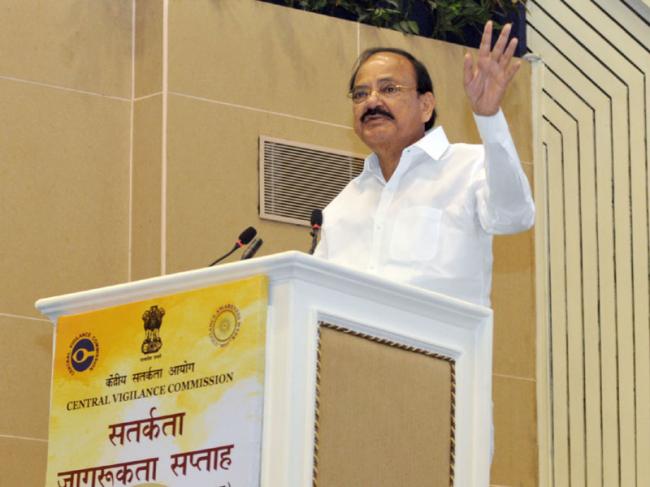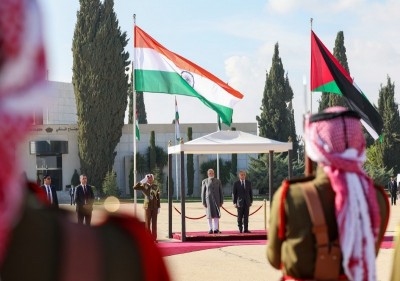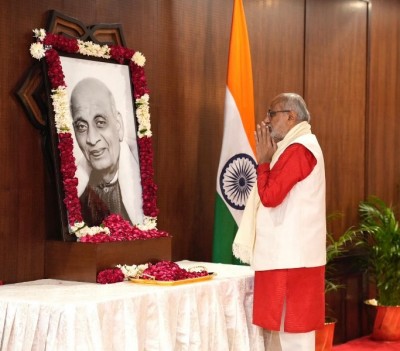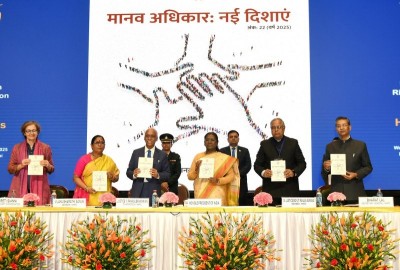
We must ensure that benefits of democratic governance reach every citizen in our country: Vice President
New Delhi, Oct 30 (IBNS): Vice President M. Venkaiah Naidu on Monday said that the country it should be ensured that the benefits of democratic governance reach every citizen in the country.
He was addressing the gathering after inaugurating the ‘Vigilance Awareness Week’ with the theme “My Vision-Corruption-free India”, organised by the Central Vigilance Commission, here today. The Minister of State for Development of North Eastern Region (I/C), Prime Minister’s Office, Personnel, Public Grievances & Pensions, Atomic Energy and Space, Dr. Jitendra Singh, the Cabinet Secretary, Shri P.K. Sinha, the Central Vigilance Commissioner, K.V. Chowdary and other dignitaries were present on the occasion.
The Vice President said that we should go to the roots of corruption and strike at it.
He further said that constant vigilance is required to see that the vast beautiful tree of our country is not eaten up by weeds and pests.
The tree must be protected, preserved and nourished continuously by rejuvenating the entire eco-system, he added.
The Vice President said that Sardar Patel represents the best values in the Indian tradition so far as governance is concerned and he integrated the country and also was a shining example of integrity and probity in public life.
He further said that we must draw inspiration from Sardar Vallabhai Patel’s messages and his life.
His sense of realism and pragmatic approach to issues allowed him to face challenges and demonstrate his successful leadership qualities, he added.
The Vice President said that honesty and integrity are essential components of social capital.
They add value to the economic capital and intellectual capital of any society and country, he added.
The Vice President said that procedures and implementation of laws should become more citizen-centric.
Each citizen should be able to access quality services without harassment, undue delays and corrupt practices, he added.
The Vice President said that all out efforts should be made to improve the educational system to inculcate strong values, ethical conduct and commitment towards the welfare of the society at large.
He further said that the Central Vigilance Commission is trying to promote “Integrity Club” in schools and colleges and this initiative will no doubt pay rich dividends in future.
He commended the Commission for its concerted efforts in battling the blight of corruption.
Following is the text of Vice President’s address:
“I am happy to inaugurate the Vigilance Awareness Week, 2017.
I am happy to note that the Central Vigilance Commission is organizing a number of programmes during this week to create greater awareness about corruption and the need to be aware of and combat it at all levels by everyone.
The theme “My Vision-Corruption-free India” has been aptly chosen. If we want India to become a stronger economic power and if we want to create an India in which every citizen will be able to enjoy his/her rights and lead a better quality of life, we need “Su-rajya” or clean polity and good governance. We need to have good governance to take the development to the people. We must translate into reality the grand vision of great leaders like Sardar Vallabhai Patel, whose birth anniversary is being celebrated across the country today.
Addressing the senior civil servants almost seventy years ago, Sardar Patel had said: “Unhappily India today cannot boast of an incorruptible service, but I hope that you who are now starting, as it were, a new generation of Civil Servants, will not be misled by black sheep in the fold, but would render your service without fear or favour and without, any expectation of extraneous rewards. If you serve in the true spirit of service I am sure you will have your best reward.”
The “black sheep” in all walks of life are the visible face of corruption. They thrive in a system that has low accountability, low transparency, cumbersome, poorly understood procedures and high discretionary powers. It is this system that we should reform and transform. The Prime Minister has given a three-line mantra – Reform, Perform and Transform. We should go to the roots of corruption and strike at it. Constant vigilance is required to see that the vast beautiful tree of our country is not eaten up by weeds and pests. The tree must be protected, preserved and nourished continuously by rejuvenating the entire eco-system.
One of the instruments for building a healthy polity is the Central Vigilance Commission established in 1964. It was created on the basis of the recommendations of Santhanam Committee for exercising general superintendence over the vigilance administration in Government. The Commission was conferred statutory status through an Act of Parliament in 2003 and it also became a multimember body. In 2004 it became a designated authority to receive Whistle Blower complaints and to give protection to Whistleblowers.
In June 2000, the Commission decided to observe Vigilance Awareness Week every year starting from 31stOctober, the birthday of Bharat Ratna Sardar Vallabhbhai Patel. The purpose is to make every citizen realise need to collectively combat the menace of corruption.
Sardar Patel represents the best values in the Indian tradition so far as governance is concerned. He integrated the country and also was a shining example of integrity and probity in public life.
I would like to quote Bharat Ratna Sardar Vallabhbhai Patel who said:
“The negligence of a few could easily send a ship to the bottom”, but with “the whole hearted cooperation of all on board, she could be safely brought to port”.
We cannot afford to allow our ship to sink. We have a collective responsibility to steer this ship through troubled waters.
We must draw inspiration from Sardar Vallabhai Patel’s messages and his life. There are innumerable incidents relating to his iron will and courage, in public and private life. He commanded respect and popularity owing to his integrity, truthfulness and firmness. His sense of realism and pragmatic approach to issues allowed him to face challenges and demonstrate his successful leadership qualities.
Sardar Patel exemplified an ethical approach in his life, behaviour and dealings; personal rectitude and austerity were part of his being. It is these qualities that we must seek to imbibe and strive to emulate in our work and in our lives.
Let me outline a few ways in which we can achieve a new India that is clean, not only by physically removing the garbage from our streets but also by creating a corruption-free governance structure.
We, in leadership positions, must lead by example.
Honesty and integrity are essential components of social capital. They add value to the economic capital and intellectual capital of any society and country. They are reflective of our societal norms and attitudes. If we have to live up to the high standards of integrity set by the leaders who have given us freedom, it is imperative that we revive the values of hard work, honesty, empathy and integrity.
We have to ‘live’ these values not merely talk about them.
We must ensure that the benefits of democratic governance reach every citizen in our country.
Governance should have citizens as the central focus and try to address the needs of the different segments of population effectively. Procedures and implementation of laws should become more citizen-centric. Each citizen should be able to access quality services without harassment, undue delays and corrupt practices. Information should be freely shared. Standard operating procedures should be in place reducing the amount of discretion.
Active involvement and participation by all stakeholders and actors is critical.
The vision of Sardar Patel to see India as a great nation can only be achieved through active involvement of all sections of the population and key pillars of our governance structure. The presence of a strong civil society including a free press and independent judiciary are important pre-conditions for good governance.
The role of the media and of civil society in fighting the menace of corruption is also very important. A media that is objective, balanced and neutral in its reporting and ethical in functioning can have a great impact.
Through their outreach efforts, civil society organisations can play a significant role in educating and creating awareness among the people.
Sharing of accurate information and universal literacy are key arsenal
I have always believed that information that has been sanctified with confirmation is the most powerful ammunition to fight corruption. Providing timely and accurate information empowers citizens. The Right to Information Act must be used to inform, enlighten and empower. We need to step up our national efforts to achieve universal literacy. It is virtually impossible to achieve a corruption-free society with more than 25 percent of our citizens being unable to read and write. Once we achieve universal basic literacy, we would have created a literate society that can understand the citizens’ entitlements and access public services and benefit from all socio-economic development programmes. We would have then created a critical mass of enlightened citizenry that can more confidently participate in the democratic processes. We would have deepened our democratic roots.
I strongly feel that the most effective antidote to corruption is an active, involved and empowered citizenry. In other words, the most potent weapon against corruption is people like you and me. Each one of us must set new benchmarks by adopting zero tolerance for corrupt practices. Ultimately, it must be understood that all the malpractices, double-dealing, nepotism and other such practices, be it governmental or organizational, hurt us. Therefore we must all join hands and pledge to root it out of the system.
The first step towards empowering the citizens is creating awareness among them. It is extremely important for the common citizen to be aware of what to expect from the Government.
In this context, the efforts and commitment of the Central Vigilance Commission towards awareness generation and ensuring public participation in fighting the scourge of corruption are laudable whether through the display of hoardings and banners or grievance redressal camps for citizens, the awareness gram sabhas or through ‘walkathons’, ‘nukkad nataks’ or other means. I am happy to note that the Commission has circulated an Integrity Pledge to be taken by Government officials and the citizens. Such pledges have been found to be quite effective around the world in binding people to follow the path of honesty. Such public commitment by civil servants, students, journalists, educators, NGOs, and citizens, is not only a tool for creating awareness but can act as a force multiplier for the society at large to take the fight against corruption seriously.
Simplify, streamline, standardize and digitalize
Corruption undermines economic development by causing considerable distortion and inefficiency. It increases the cost of business through the price of illicit payments, the management cost of negotiating with officials and the risk of breached agreements.
If India has to welcome investors, the ease of doing business must be considerably enhanced. The Prime Minister came out with a statement, saying that, it is not red-tape, it is red-carpet to the investors. Investments will come if the procedures are simple, if there is no harassment, if there is no corruption, investors will be happy to come here and invest money. The regulatory controls must be minimized and the procedures should be clear, simple, streamlined and digitalized so that there is very little ambiguity or discretion. The regulation should not become strangulation. We must standardize procedures and inform all citizens what these procedures are. Uncertainty and lack of information gives undesirable power to the implementing machinery. Citizen Charters have been a good step forward in this direction.
Apart from this, the cutting edge administration with which the common man comes into contact with the Government or its agencies needs a radical transformation.
The use of Information and Communication Technology has helped create efficient, transparent and accountable systems with no scope for arbitrariness and discretion while enabling better quality and efficient delivery of services.
The Digital India initiative has ensured that Government services are made available to citizens electronically by improving online infrastructure and by increasing Internet connectivity i.e. by making the country digitally empowered.
I am confident that the Central Vigilance Commission will continue this challenging mission to not only point out some omissions and commissions by individuals but also to ensure that the society is free of this malaise of corruption. It can do so, probably in conjunction, with other bodies like the Central Information Commission, the Election Commission of India and the Comptroller and Auditor General of India which have mandates that could potentially contribute to a clean and corruption-free India that we wish to see by 2022.
All out efforts should be made to improve the educational system to inculcate strong values, ethical conduct and commitment towards the welfare of the society at large. The Commission, I am told, is trying to promote “Integrity Club” in schools and colleges. This initiative will no doubt pay rich dividends in future.
Mahatma Gandhi had said that: “As human beings, our greatness lies not so much in being able to remake the world - that is the myth of the atomic age - as in being able to remake ourselves”. Remaking the world starts with remaking ourselves, our communities and our country.
We surely have a long way to go. We are slowly improving on the global corruption perception index- from 38 in 2015 to 40 in 2016. But we can make quicker and lasting progress if we identify the key levers that can make a difference and take systematic action on each of them. I am sure that the government is not only aware of the challenge but is also committed to make a difference by 2022. The recent policy interventions including tax reforms could contribute to this societal transformation.
Why the people have welcomed the demonetisation, though it is painful for them. Because, they could understand the temporary pain is for long term gain. And the idea of opening Bank Accounts to all people under Jan Dhan, understood by the public after demonetisation.
I take this opportunity to felicitate the Commission for its concerted efforts in battling the blight of corruption.
Let us resolve to work relentlessly and assiduously to ensure a corruption free India.
Thank you. Jai Hind.”
Support Our Journalism
We cannot do without you.. your contribution supports unbiased journalism
IBNS is not driven by any ism- not wokeism, not racism, not skewed secularism, not hyper right-wing or left liberal ideals, nor by any hardline religious beliefs or hyper nationalism. We want to serve you good old objective news, as they are. We do not judge or preach. We let people decide for themselves. We only try to present factual and well-sourced news.







